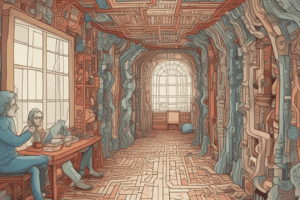Podcast
Questions and Answers
What is one practical application of Piaget's theory mentioned in the text?
What is one practical application of Piaget's theory mentioned in the text?
- Explaining the behavior of adults
- Predicting weather patterns
- Understanding cognitive development in children (correct)
- Analyzing historical events
Which area besides psychology benefits from Piaget's ideas?
Which area besides psychology benefits from Piaget's ideas?
- Music
- Astronomy
- Engineering
- Medicine (correct)
What is a criticism of Piaget's theory mentioned in the text?
What is a criticism of Piaget's theory mentioned in the text?
- Overestimation of children's abilities
- Too much emphasis on social factors
- Underestimation of adult abilities
- Neglect of social factors influencing cognitive development (correct)
Why are Piaget's findings considered particularly useful?
Why are Piaget's findings considered particularly useful?
Which term best describes Piaget's concept of conservation?
Which term best describes Piaget's concept of conservation?
What can be inferred about the impact of Piaget's work on educational practices?
What can be inferred about the impact of Piaget's work on educational practices?
What does the term 'conservation' refer to in Piaget's theory?
What does the term 'conservation' refer to in Piaget's theory?
According to Piaget, why do children initially lack the ability to understand conservation?
According to Piaget, why do children initially lack the ability to understand conservation?
How did Piaget suggest children gradually learn the concept of conservation?
How did Piaget suggest children gradually learn the concept of conservation?
In what way has Piaget's work influenced modern theories on cognitive development and education?
In what way has Piaget's work influenced modern theories on cognitive development and education?
Which fields have applied Piaget's ideas, as mentioned in the text?
Which fields have applied Piaget's ideas, as mentioned in the text?
What significant effects has Piaget's concept of conservation had on human development and learning processes?
What significant effects has Piaget's concept of conservation had on human development and learning processes?
Flashcards are hidden until you start studying
Study Notes
Piaget's Concept of Conservation
Jean Piaget was a Swiss psychologist who developed the theory known as cognitive development. One of his most significant contributions to this field is his work on understanding how children develop their concepts of physical conservation. This section will discuss Piaget's concept of conservation, focusing on its implications, effects, and applications, as well as addressing some criticisms.
Overview
The term "conservation" refers to the child's ability to perceive certain properties, such as mass and length, as remaining constant even when there are changes in shape, arrangement, or appearance. Piaget argued that children initially lack this ability due to their logical thinking and only gradually learn it through experience. He believed that children acquire knowledge through interaction with their environment and that this process evolves throughout childhood.
Implications
Piaget's work has influenced modern theories on cognitive development and education. His ideas have been applied in various fields, including psychology, philosophy, anthropology, linguistics, sociology, neuroscience, physics, mathematics, and economics. For instance, his findings on children's learning processes can help educators tailor instructional methods to the individual needs of students.
Effects
Piaget's concept of conservation has had significant effects on our understanding of human development and learning processes. His work has been used to explain cognitive development by demonstrating how children acquire various concepts over time. For example, children learn about the properties of objects, such as solidity or weight, which can be applied to more complex issues like integrating new information into existing knowledge.
Applications
Piaget's theory has practical applications in fields beyond psychology, including education and medicine. This is because his ideas provide insights into how individuals develop concepts, think, solve problems, and interact with their environment. These findings are particularly useful when designing interventions or treatments aimed at supporting cognitive development, especially in children who may have experienced delays or difficulties in this area.
Criticism
Despite its contributions, Piaget's theory is not without criticisms. Some argue that his view neglects social factors influencing cognitive development. Others claim that he underestimated children's abilities, suggesting that they might grasp some principles earlier than Piaget supposed. Nevertheless, these criticisms do not diminish the importance of Piaget's contribution to understanding cognitive development.
In conclusion, Jean Piaget's concept of conservation represents a cornerstone of modern theories on cognitive development. By studying how children acquire concepts related to physical quantities, we gain valuable insights into the human mind and the process of learning. These discoveries continue to inform educational practices and influence diverse disciplines, helping to improve our understanding of human behavior and potential for growth.
Studying That Suits You
Use AI to generate personalized quizzes and flashcards to suit your learning preferences.




